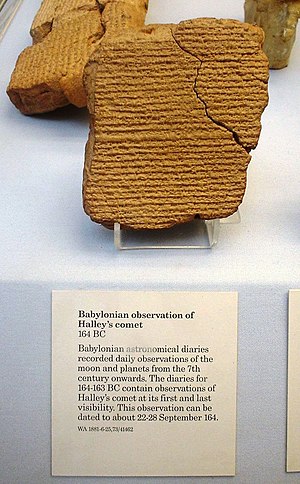
Babylonian astronomy was the study or recording of celestial objects during the early history of Mesopotamia. The numeral system used, sexagesimal, was based on sixty, as opposed to ten in the modern decimal system. This system simplified the calculating and recording of unusually great and small numbers.[1]
During the 8th and 7th centuries BC, Babylonian astronomers developed a new empirical approach to astronomy. They began studying and recording their belief system and philosophies dealing with an ideal nature of the universe and began employing an internal logic within their predictive planetary systems. This was an important contribution to astronomy and the philosophy of science, and some modern scholars have thus referred to this approach as a scientific revolution.[2] This approach to astronomy was adopted and further developed in Greek and Hellenistic astrology. Classical Greek and Latin sources frequently use the term Chaldeans for the philosophers, who were considered as priest-scribes specializing in astronomical and other forms of divination. Babylonian astronomy paved the way for modern astrology and is responsible for its spread across the Graeco-Roman empire during the 2nd Century, Hellenistic Period. The Babylonians used the sexagesimal system to trace the planets transits, by dividing the 360 degree sky into 30 degrees, they assigned 12 zodiacal signs to the stars along the ecliptic.
Only fragments of Babylonian astronomy have survived, consisting largely of contemporary clay tablets containing astronomical diaries, ephemerides and procedure texts, hence current knowledge of Babylonian planetary theory is in a fragmentary state.[3] Nevertheless, the surviving fragments show that Babylonian astronomy was the first "successful attempt at giving a refined mathematical description of astronomical phenomena" and that "all subsequent varieties of scientific astronomy, in the Hellenistic world, in India, in Islam, and in the West … depend upon Babylonian astronomy in decisive and fundamental ways."[4]
- ^ Friberg 2019.
- ^ Brown 2000, p. 5–6,.
- ^ Aaboe 1958, p. 209.
- ^ Aaboe 1974, p. 21.